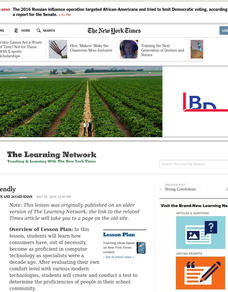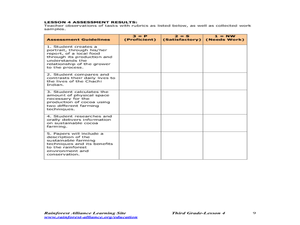Facing History and Ourselves
Hands Up, Don't Shoot!
Why is it so difficult to develop a clear understanding of the events surrounding the shooting of Michael Brown by a Ferguson, Missouri, police officer? To answer this question class members listen to a NPR discussion of the findings of...
Facing History and Ourselves
Verifying Breaking News
The attempts of journalists to verify the events surrounding the shooting of Michael Brown take center stage as individuals analyze three of the initial newspaper accounts of the story. The whole class discussion then focuses on the...
Captain Planet Foundation
Energy Flow in the Garden
How can you tell what an owl has eaten? Study the food chain and flow of energy in an ecosystem by dissecting an owl pellet and noting the bones found inside. Additionally, the lesson includes a game about consumers and producers with a...
PricewaterhouseCoopers
Consumer Fraud
Falling into the hands of a credit scam is much too common these days, and the young adults in the classroom need to be prepared. Through the activity, learners discover how to be a safe spender and use common sense when presented with a...
Curated OER
What Did It Cost 100 Years Ago?
Students compare prices of good across the century in order to introduce the topic of inflation. They undertand the concepts of inflation and Consumer Price Index (CPI), use online calculators to figure the approximate cost of goods...
Curated OER
Name Brands
Students explore the possibility that a products name might bias a consumers decision to buy a particular product. The question remains to be answered, "Why do consumers buy what they buy and why that particular product?"
Curated OER
User Friendly
Students explore how consumers have become as proficient in computer technology as specialists were a decade ago. They create and conduct a test to determine the proficiencies of people in their school community.
Curated OER
ESOL Competencies: Consumer Education
It is so important for your adult English language learners to know how to maintain their household and find the appropriate service providers when needed. Instead of using a phone book (which is rare these days), reference the internet...
EngageNY
Performance Task: Planning the Final Brochure
Partners use a Brochure Planning Guide to create brochures giving advice to consumers about products based on the research they finished about working conditions. After planning the brochure, they complete a sketch outline and then begin...
Curated OER
Consumer Law
Students discover that they can call the Washington State Attorney General's office to report deceptive sales practices. They determine what the Federal Trade Commission (FTC) is and what it does. They examine the Federal "Do Not Call"...
Practical Money Skills
Shopping Wisely
Work on making good shopping choices with a fun economics project. Kids analyze the differences between brand names and generic products, bigger and smaller units for purchase, and different places they can shop for different items.
Curated OER
Dietician - Nutritionist
There are so many different career opportunities in the health care field. Have learners explore what it takes to be a dietician or a nutritionist. They'll view a PowerPoint on each occupation and take mini-quizzes while they watch. A...
Classroom Law Project
Should we believe everything we read? Becoming a discerning consumer of media
Class members investigate the role media should play in a healthy democracy. As part of this study, groups analyze political advertising, use FactCheck to assess not only the veracity of but the persuasions techniques used in candidates'...
Statistics Education Web
Consuming Cola
Caffeine affects your heart rate — or does it? Learners study experimental design while conducting their own experiment. They collect heart rate data after drinking a caffeinated beverage, create a box plot, and draw conclusions. They...
Statistics Education Web
Text Messaging is Time Consuming! What Gives?
The more you text, the less you study. Have classes test this hypothesis or another question related to text messages. Using real data, learners use technology to create a scatter plot and calculate a regression line. They create a dot...
K20 LEARN
Identity Theft: Don't Let This Happen to Your Grandma!
Class members consider how people steal online identities as they discover the essential elements of identity theft and consumer fraud. Pupils demonstrate learning by creating a poster or video about how to avoid identity theft.
Digital Public Library of America
African American Soldiers in World War I
Finding good primary source materials to support any study of history can be a challenge and time-consuming. A set of 11 primary source letters, images, and text excerpts provide young historians with an opportunity to sharpen their...
Curated OER
Four Dollars and Fifty Cents
Learners role play a scenario between a creditor and debtor. In this consumer education lesson, students read the book Four Dollars and Fifty Cents, discuss the vocabulary introduced in the book and role play a situation between a...
Facing History and Ourselves
Citizen Watchdogs and the News
To conclude their case study of media coverage of the shooting of Michael Brown by a Ferguson, Missouri, police officer, class members consider the role of citizen watchdogs in a democratic society, develop strategies for combating...
Curated OER
Being an Educated Consumer of Statistics
Students examine kinds of data used to report statistics, and create their own statistical report based on any of the four sources of media information (Internet, newspaper, TV, magazine).
Curated OER
What Time Does the Last Worker Report?
Third graders explore the concepts of time and consumer goods. In this telling time instructional activity, 3rd graders respond to questions about the passage of time and goods and services. This instructional activity incorporates the...
Curated OER
Equadorian Rainforest: The Tropical Supermarket
Learners study the concept of sustainable agricultural practices through cocoa farming and the lives of the people who are the producers. Students watch a slide show and read a story which helps them understand the origins of chocolate,...
Curated OER
Consumer Product Testing
Eighth graders watch segments of CBS's Street Cents and discuss approaches used on the program. They create standards for various items and learn why they are important to have. They test different fabrics to explore clothing standards.
Curated OER
You Are What You Eat: Chemical Residues and Consumers
High schoolers determine how evidence gained from a simulated test for the presence of pesticide residues can be used to determine risk. They use peas to simulate pesticide residue testing.

























